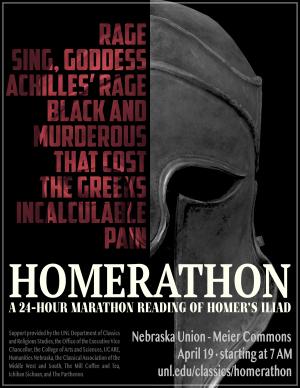Blog: Sampling Epic in Kendrick Lamar’s “Mortal Man”
By Justine McConnell | March 14, 2022
Because it’s spirits, we ain’t even really rappin’
We just letting our dead homies tell stories for us.
Blog: Truth Behind Myth: Video Games and the Recreation of the Trojan War
By Peter Gainsford | October 23, 2020
August 2020 saw the release of A Total War Saga: Troy, a strategy video game where the player takes on the role of one of various heroes on either side of the Trojan War and leads their armies to victory. If you’ve ever wanted to play Penthesilea defeating Achilles, here’s your chance.
Blog: What Parts of Classics Would We Choose To Preserve for the Future?
By Nandini Pandey | July 10, 2020
In light of the present administration’s brazen disregard for facts and the public good, you’ve got to admire past leaders’ nonpartisan concern to preserve knowledge for the future.
Blog: What Are the Best Classics Books for Children?
By Sarah Bond | July 3, 2020
Finishing my third trimester in the midst of a pandemic was not what I had planned for the last months of pregnancy. Since the Ides of March, we have sequestered ourselves in our house in Iowa City and cancelled any and all social gatherings––including the planned baby shower––as has almost everyone else across the globe. Although I lamented not being able to celebrate with family and friends in person, every day it seemed, small book-shaped cardboard boxes began to populate the front stoop. Their opening revealed that our academic friends had sent us their favorite books in hopes that reading to our little one might bring comfort, amusement, and maybe a little sleep into our lives.
Blog: ‘Greater the Profit...When Two Go Together” [Il. 10.224-5]: Homeric Adventures in Collaboration and Open Access Publishing
By Joel Christensen | March 12, 2020
Blog: Classics and Pop Music: Classical Allusions and Literary Techniques in the Music of Jay-Z
By Samuel Flores | May 16, 2019
At a 2010 forum at the New York Public Library featuring Harvard professor Cornel West and Jay-Z (Shawn Carter), Prof. West recalled one of his seminars at Princeton, which had featured a panel of Jay-Z, Toni Morrison, and Phylicia Rashad. West recalled discussing how Plato “made the world safe for Socrates, so the people would remember the name of Socrates forever,” and Jay-Z replied, “Well I have been playing Plato to Biggie’s Socrates.” As it turns out, there is a great deal of classical allusion to unpack in the world of hip-hop, many embedded within the lyrics of Jay-Z.
Blog: Connecting with Community at the University of Iowa's Homerathon
By Rosemary Moore | April 18, 2019
For a number of years, our local Eta Sigma Phi chapter has been organizing public readings of the sorts of things classicists cut their teeth on – or at least feel like we do: Homer’s epics, Vergil, Ovid. These have always been a wonderful experience for our department – everyone involved loves the opportunity to read and hear these works as they were meant. We decided that this year we wanted to reach a different and larger audience than before, inspired by the outreach of, among others, Bob Cargill and the University of Nebraska's Homerathon tradition (which the SCS Blog covered last year).
Blog: The Oral Tradition: How Classics Students Organized a Homerathon in Nebraska
By Matthew Loar | August 29, 2018
With the thermometer outside registering a frigid 29 degrees Fahrenheit at 7am on Thursday, April 19, 2018, a cohort of undergraduate Classics students at the University of Nebraska–Lincoln (UNL) launched their Homerathon: a marathon reading of Stanley Lombardo’s translation of Homer’s Iliad, which ran non-stop until 3am the next morning. The event taught students and listeners a lot about the difficulties and benefits of the ancient tradition of oral poetry—but brought Classics back out into the public sphere and made an argument for its relevance today.

Blog: A Regular Roman’s Guide to the World Cup Semifinal Match
By Joel Christensen | July 10, 2018
“For as long as he lives, a man has no greater glory
than that which he wins with his own hands and feet”
οὐ μὲν γὰρ μεῖζον κλέος ἀνέρος, ὄφρα κεν ᾖσιν,
ἢ ὅ τι ποσσίν τε ῥέξῃ καὶ χερσὶν ἑῇσιν.
Homer, Odyssey 8.147-148
Salve, My ancient Roman friend—I know that much of this world of ours confuses you. Not if I had ten thousand mouths and as many years could I cover the histories of the centuries between your world and ours, nor could I catalog and explain airplanes, televisions, cell phones, and the droning chorus of wonders and horrors you see around you.
But maybe I can start with something which will help bridge the gulf between your world and ours—sport. Even though the younger Pliny mocked his contemporaries for their passion for horse races, passion for sport is an ancient inheritance.
Review: Reviewing A Digital Edition of Homer
By Bill Beck | May 6, 2018
The Homer Multitext (HMT) has something in common with the poetry it documents: They are both monumental and impressive works whose gradual evolution over many years by many hands has left traces of its past; it exists in several forms that present the same information in slightly different ways, and its development through changing technologies has left occasional redundancies. Like the Iliad, it lives up to its title, but perhaps not in the way one expects. And like its poetic source text, it richly rewards those who plumb its depths.
